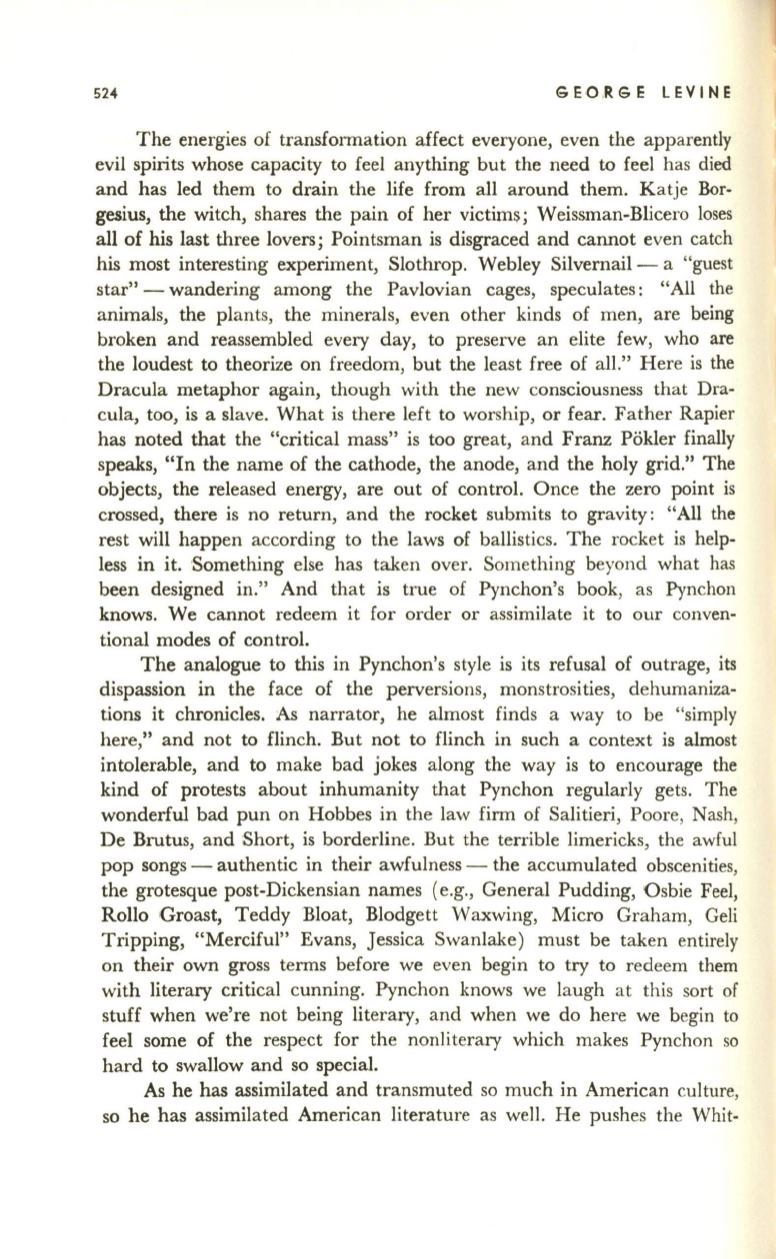
52-4
G EO ,RGEL EV I N E
The energies of transformation affect everyone, even the apparently
evil spirits whose capacity to feel anything but the need
to
feel has died
and has led them to drain the life from all around them. Katje Bor–
gesius, the witch, shares the pain of her victim$; Weissman-Blicero loses
all of his last three lovers; Pointsman is disgraced and cannot even catch
his most interesting experiment, Slothrop. Webley Silvernail- a "guest
star" - wandering among the Pavlovian cages, speculates: "All the
animals, the plants, the minerals, even other kinds of men, are being
broken and reassembled every day, to preserve an elite few, who
are
the loudest to theorize on freedom, but the least free of all." Here is the
Dracula metaphor again, though with the new consciousness that Dra–
cula, too, is a slave. What
is
there left to worship, or fear. Father Rapier
has noted that the "critical mass" is too great, and Franz PokIer finally
speaks, "In the name of the cathode, the anode, and the holy grid." The
objects, the released energy, are out of control. Once the zero point is
crossed, there is no return, and the rocket submits to gravity: "All the
rest will happen according to the laws of ballistics. The rocket is help–
less in it. Something else has taken over. Something beyond what has
been designed in." And that is true of Pynchon's book, as Pynchon
knows. We cannot redeem it for order or assimilate
it
to our conven–
tional modes of control.
The analogue to this in Pynchon's style is its refusal of outrage, its
dispassion in the face of the perversions, monstrosities, dehumaniza–
tions it chronicles.
As
narrator, he almost finds a way to be "simply
here," and not to flinch. But not to flinch in such a context is almost
intolerable, and to make bad jokes along the way is to encourage the
kind of protests about inhumanity that Pynchon regularly gets. The
wonderful bad pun on Hobbes in the law firm of Salitieri, Poore, Nash,
De Brutus, and Short, is borderline. But the terrible limericks, the awful
pop songs - authentic in their awfulness - the accumulated obscenities,
the grotesque post-Dickensian names (e.g., General Pudding, Osbie Feel,
Rollo Groast, Teddy Bloat, Blodgett Waxwing, Micro Graham, Geli
Tripping, "Merciful" Evans, Jessica Swanlake) must be taken entirely
on their own gross terms before we even begin to try to redeem them
with literary critical cunning. Pynchon knows we laugh at this sort of
stuff when we're not being literary, and when we do here we begin to
feel some of the respect for the nonliterary which makes Pynchon so
hard to swallow and so special.
As he has assimilated and transmuted so much in American culture,
so he has assimilated American literature as well. He pushes the Whit-


